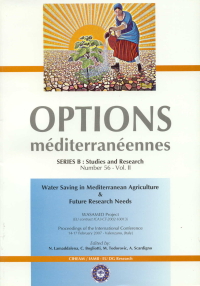| Article précédent | p. 305-320 | Article suivant |
A framework for irrigation management during drought: application in two case studies in the Tagus basin, Spain
The purpose of this study is to provide a framework for effective and systematic risk management of water for irrigation during drought. The decision support tool for irrigation management during drought periods integrates hydrological, agricultural and water planning models. The methodology has three components: first, the statistical properties of drought are analysed based on historical series of precipitation and runoff and thresholds of drought alert are determined to serve as triggers for management actions. Second, water demand for agriculture is determined through the normal and drought period. Extreme drought periods are used to simulate climate change scenarios and project potential situations of water conflict. Third, a water planning model is used to integrate water availability and demand and evaluate the range of possible management actions that minimise the risk of water deficit. The advantages of this methodological approach is that links the dynamic aspects of water availability and demand and its statistical properties needed for risk analysis to operational aspects of water management at the basin level. The methods are then tested in two contrasting case studies in the Tagus basin in Spain and exemplify many other Mediterranean agricultural systems.
- [ Afficher ]
- [ Télécharger ]
- [ Exporter la citation ]
Vous pouvez télécharger la citation au format :
- [ Imprimer ]
-
Mots-clés
ESPAGNE, GESTION DES EAUX, IRRIGATION, METHODE, SECHERESSECiter cet article
Moneo M., Iglesias A. A framework for irrigation management during drought: application in two case studies in the Tagus basin, Spain. In : Lamaddalena N. (ed.), Bogliotti C. (ed.), Todorovic M. (ed.), Scardigno A. (ed.). Water saving in Mediterranean agriculture and future research needs [Vol. 2]. Bari : CIHEAM, 2007. p. 305-320. (Options Méditerranéennes : Série B. Etudes et Recherches; n. 56 Vol.II). Proceedings of the International Conference WASAMED Project (EU contract ICA3-CT-2002-10013), 2007/02/14-17, Valenzano (Italy). http://om.ciheam.org/om/pdf/b56_2/00800199.pdf



